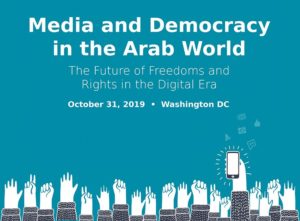 Since the 2011 uprisings, Arab countries have struggled to define a new social contract that would insulate their citizens from forces of exclusion—forces that range from poverty, inequality and unemployment to water scarcity, corruption and gender discrimination, the Atlantic Council’s Rafik Hariri Center for the Middle East and the United Nations Development Programme observe.
Since the 2011 uprisings, Arab countries have struggled to define a new social contract that would insulate their citizens from forces of exclusion—forces that range from poverty, inequality and unemployment to water scarcity, corruption and gender discrimination, the Atlantic Council’s Rafik Hariri Center for the Middle East and the United Nations Development Programme observe.
In some cases, reforms and policies aiming at modernization have, as an unintended consequence, generated greater inequality rather than greater inclusion. In other cases, exclusion has fueled societal tensions, instability and ultimately violence, putting people at greater risk of marginalization. If ongoing conflicts are not resolved and demographic projections do not deviate from current trends, 40 percent of people in Arab countries will live in crisis and conflict conditions by 2030.
The Atlantic Council’s Rafik Hariri Center for the Middle East and the United Nations Development Programme host a presentation* previewing the forthcoming 2019 Arab Human Development Report, followed by a panel discussion. The report will focus on the struggle for citizenship in all its dimensions in Arab countries. Dr. Adel Abdellatif, Senior Strategic Advisor at the Regional Bureau for Arab States, will present the conceptual framework for the forthcoming report (briefly outlined in this research paper) and preview some of the preliminary results of surveys conducted in twelve Arab countries. RSVP
Tuesday, October 1, 2019. 2:00 – 3:30 p.m. Atlantic Council, 1030 15th Street NW, 12th Floor, (West Tower Elevator), Washington, DC
Presenters
Dr. Adel Abdellatif, Senior Strategic Advisor, Regional Bureau for Arab States, UNDP
Ms. Paola Pagliani, Policy Specialist, UNDP
Discussants
Dr. Amaney Jamal, Edwards S. Sanford Professor of Politics, Princeton University
Dr. James Zogby, Managing Director, Zogby Research Services
Moderator
Ambassador Richard LeBaron, Nonresident Senior Fellow, Rafik Hariri Center for the Middle East, Atlantic Council
 First came the disintegration of the Ottoman Empire following World War I; then, in the 1950s and ’60s, the Nasser-inspired wave of Arab nationalism and socialism. The Arab world’s third great political cataclysm of the past 100 years—the 2011 uprisings—has also brought permanent changes, but not as its activists had hoped, David Ottaway and Marina Ottaway observe. Their consequences have differed greatly from area to area, splintering the Arab region into four different worlds, they write in “A Tale of Four Worlds: The Arab Region After the Uprisings”:
First came the disintegration of the Ottoman Empire following World War I; then, in the 1950s and ’60s, the Nasser-inspired wave of Arab nationalism and socialism. The Arab world’s third great political cataclysm of the past 100 years—the 2011 uprisings—has also brought permanent changes, but not as its activists had hoped, David Ottaway and Marina Ottaway observe. Their consequences have differed greatly from area to area, splintering the Arab region into four different worlds, they write in “A Tale of Four Worlds: The Arab Region After the Uprisings”:
- The Levant states have disintegrated, possibly irreversibly.
- The Gulf monarchies have embarked on far-reaching plans of economic and social change to stave off discontent.
- Egypt has retreated into military authoritarianism and a war on Islamists, threatening its future stability.
- Only the Maghreb countries, which have started integrating Islamists into their political systems, offer some hope for progress toward democracy.
The Woodrow Wilson Center Middle East Program hosts a discussion on “A Tale of Four Worlds: The Arab Region After the Uprisings.” Speakers: co-authors David Ottaway and Marina Ottaway; and David Ignatius, Washington Post opinion writer.
9:30 a.m. September 18, 2019. Venue: Woodrow Wilson Center, One Woodrow Wilson Plaza, Ronald Reagan Building, 1300 Pennsylvania Avenue NW, Sixth Floor, Washington, D.C. RSVP
 Arab Center Washington DC is organizing its fourth annual conference dedicated to exploring the role of media and new technologies in human rights and democracy in the Arab world. The conference will address the following questions:
Arab Center Washington DC is organizing its fourth annual conference dedicated to exploring the role of media and new technologies in human rights and democracy in the Arab world. The conference will address the following questions:
- How are propaganda and mass disinformation campaigns disseminated through traditional and social media platforms?
- How can different media tools contribute to the progress toward democracy and human rights?
- What is the impact of cyber-crime laws and why are they being introduced at a rapid pace across the Arab world?
- Are social media trends still an accurate reflection of public sentiment in certain Arab countries? How prevalent are ‘Troll Factories’ in the region?
- How are cyber geopolitics and cyber warfare creating new political trends in the Middle East? RSVP







